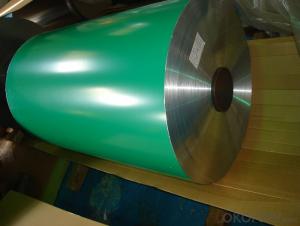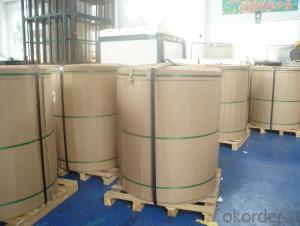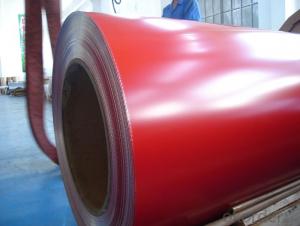Aluminum Can Tab Materials 5182 H48 with Different Colors
- Loading Port:
- Shekou
- Payment Terms:
- TT OR LC
- Min Order Qty:
- 5 m.t.
- Supply Capability:
- 100000 m.t./month
OKorder Service Pledge
OKorder Financial Service
You Might Also Like
1.Structure of Aluminum Can Tab Materials 5182 H48 with Different Colors
We normally use 5182, H48 to produce coated aluminum coils, which are widely used in aluminum can tabs or ring-pulls. Based on ordinary aluminum, we add Mn and Mg, so as to increase tensile strength and elongation.
We have different colors for tabs, such as blue, red, transparent, etc. We also can adjust coating according to color of customers and offer personalized services.
We use large wave shear, transverse shear and longitudinal cut system so as to meet different specifications of customers.
2. Main Features of Aluminum Can Tab Materials 5182 H48 with Different Colors
• Light Weight
• High Flatness
• Good Weathering
• Colorful
• Recycling
• Saving Energy
• Rustproof
3. Aluminum Can Tab Materials 5182 H48 with Different Colors Images
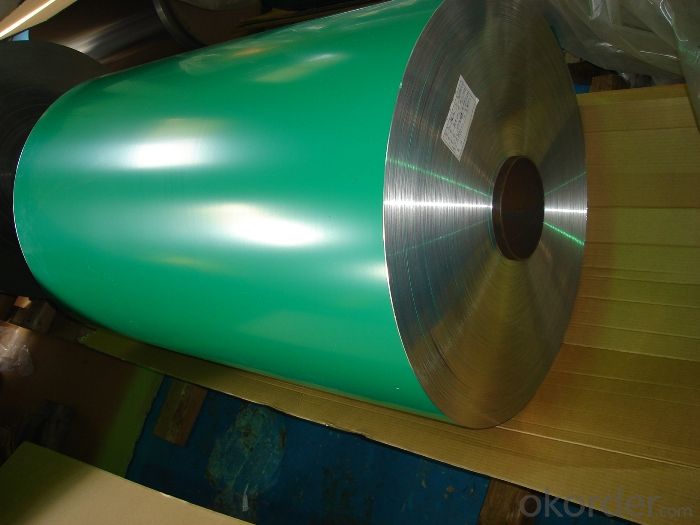
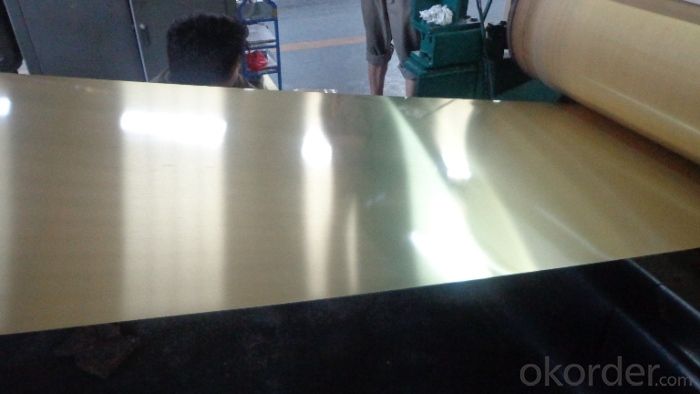
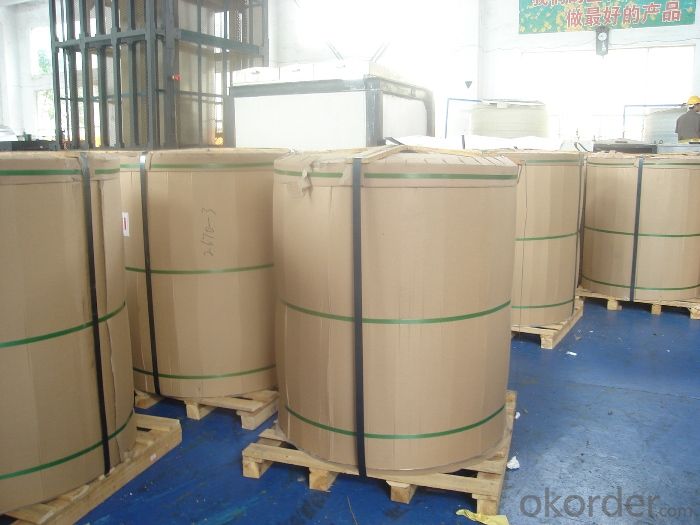
4. Specification of Aluminum Can Tab Materials 5182 H48 with Different Colors
ALLOY | TEMPER | THICKNESS | WIDTH | COIL OR LENGTH |
5052 5182 | H19 H36 H48 H49 | 0.22-0.5mm | 500-1600mm | AS PER YOUR REQUIREMENTS |
5. FAQ
A.What about inspections to guarantee quality?
For each order, we will arrange strict inspection for raw materials, inspection during production and inspection for finished goods.
With requirement of customers, we also can arrange the third party inspection.
B.What about delivery?
We will put order in production schedule after order gets confirmed against copy of TT or L/C. Normally it takes about one month for production. Exact shipment schedule is different based on different sizes and quantity.
C.What is the MOQ?
5 tons for each size.
D. Where have you exported?
We have exported to many countries. Main markets include South East Asia, Middle East, North America, South America, etc.
- Q:0.6mm insulation aluminum coil price insulation aluminum coil where to buy the most assured?
- If the surface of the aluminum color, it is directly on the Internet search color coated aluminum roll can be. Best site inspection, and now more factories, quality uneven
- Q:Are aluminum coils suitable for food processing and packaging?
- Yes, aluminum coils are suitable for food processing and packaging. Aluminum is a versatile metal that offers numerous benefits for the food industry. Firstly, aluminum has excellent thermal conductivity, which allows for efficient heat transfer during food processing and cooking. This property ensures that food is evenly cooked and prevents hot spots or uneven heating. Additionally, aluminum is a highly corrosion-resistant material, which is crucial for food packaging. It helps to protect the food from external factors such as moisture, oxygen, and light, which can degrade the quality and freshness of the product. Aluminum coils can be easily formed into various shapes and sizes, making them ideal for packaging different food products, including cans, pouches, trays, and lids. Furthermore, aluminum is a lightweight material, which makes it convenient for transportation and reduces energy consumption during distribution. It is also recyclable, meaning that it can be reused, reducing the environmental impact of food packaging. Overall, aluminum coils are well-suited for food processing and packaging due to their excellent thermal conductivity, corrosion resistance, versatility, lightweight nature, and recyclability.
- Q:How are aluminum coils priced in the market?
- Aluminum coils are priced in the market based on several factors. The primary factor influencing the price of aluminum coils is the current market price of aluminum. Since aluminum is a commodity, its price is determined by global supply and demand dynamics, as well as factors like production costs and currency fluctuations. Additionally, the cost of processing and manufacturing aluminum coils also affects their pricing. This includes expenses such as refining, alloying, rolling, and any other specialized processes required to produce the coils. The cost of energy, labor, and raw materials used in the production process also contribute to the overall pricing. Furthermore, market competition and the overall demand for aluminum coils influence their pricing. If there is high demand for aluminum coils and limited supply, the prices are likely to be higher. Conversely, if there is low demand and excess supply, prices may be lower. The size, thickness, and quality of the aluminum coils also play a role in determining their price. Thicker, larger, and higher-quality coils generally command a higher price due to the increased material and processing costs involved. Finally, transportation costs, import/export duties, and taxes imposed by different countries can also impact the pricing of aluminum coils. These additional costs are often factored into the final price of the product. In summary, the pricing of aluminum coils in the market is influenced by the current market price of aluminum, production costs, market competition, demand and supply dynamics, size and quality of the coils, as well as additional costs associated with transportation and taxes.
- Q:Can aluminum coils be used for HVAC ducting?
- Indeed, HVAC ducting can utilize aluminum coils. Aluminum, known for its strength, lightweight properties, and resistance to corrosion, is frequently employed in HVAC systems. For the production of HVAC ductwork, aluminum coils are frequently employed as they effectively disperse air throughout the system while preserving its structural stability. Furthermore, aluminum coils exhibit remarkable heat transfer capabilities, enhancing the efficiency of cooling and heating procedures within the HVAC system. All in all, aluminum coils are an appropriate option for HVAC ducting as they offer numerous advantages and fulfill the prerequisites of a properly functioning HVAC system.
- Q:How do aluminum coils perform in high humidity environments?
- Aluminum coils perform well in high humidity environments due to their corrosion-resistant properties. The protective oxide layer on the surface of the aluminum helps prevent moisture damage, making them suitable for use in areas with high humidity levels.
- Q:Are aluminum coils suitable for heat exchanger applications?
- Yes, aluminum coils are suitable for heat exchanger applications. Aluminum has excellent thermal conductivity and corrosion resistance properties, making it an ideal choice for heat transfer in various industries such as HVAC, automotive, and refrigeration. Additionally, aluminum coils are lightweight and cost-effective, making them a popular option for heat exchangers.
- Q:What are the different types of end conditions for aluminum coils?
- The different types of end conditions for aluminum coils include plain end, slit end, trimmed end, and sheared end.
- Q:Can aluminum coils be used in electrical transformers?
- Yes, aluminum coils can be used in electrical transformers. Aluminum is often chosen as an alternative to copper due to its lower cost, lighter weight, and better thermal conductivity. However, aluminum coils may require larger sizes to achieve the same electrical performance as copper coils.
- Q:What are the advantages of using aluminum coils in various industries?
- There are several advantages of using aluminum coils in various industries. Firstly, aluminum is a lightweight material, which makes it easier to handle and transport. This also reduces the overall weight of products, leading to improved fuel efficiency. Secondly, aluminum coils have excellent corrosion resistance, making them ideal for applications in industries such as construction and automotive. Additionally, aluminum is a highly conductive material, enabling efficient heat transfer, which is beneficial in industries like HVAC and refrigeration. Lastly, aluminum is recyclable, contributing to sustainability efforts and reducing environmental impact. Overall, the use of aluminum coils offers numerous benefits in terms of weight, corrosion resistance, conductivity, and sustainability.
- Q:What are the typical delivery methods for aluminum coils?
- The typical delivery methods for aluminum coils vary depending on the size and quantity of the coils being transported. However, there are a few common delivery methods that are often used in the industry. One of the most common methods is by truck. Aluminum coils are usually transported on flatbed trucks, which provide a secure and stable platform for the coils during transit. This method is suitable for both short and long-distance deliveries, and it allows for easy loading and unloading of the coils at the destination. Another common delivery method is by rail. Rail transportation is often used for larger quantities of aluminum coils or when the delivery distance is significant. Rail cars equipped with flatbeds or specialized coil cars are used to transport the coils safely and efficiently. This method is particularly advantageous for long-distance deliveries, as it is generally more cost-effective and environmentally friendly compared to other modes of transportation. In some cases, aluminum coils may also be delivered by sea. This method is typically used for international shipments or when the coils need to be transported over long distances. Coils are usually packed into containers, securing them during the journey and protecting them from any potential damage. Shipping by sea allows for efficient transportation of large quantities of coils, but it may take longer compared to other delivery methods due to customs procedures and port handling. Lastly, smaller quantities of aluminum coils can be delivered by air freight. This method is often used when time is critical or for urgent shipments. Airplanes equipped with cargo holds are used to transport the coils, ensuring their safe and expedited delivery. However, air freight is generally more expensive than other delivery methods, so it is typically reserved for time-sensitive or high-value shipments. Overall, the typical delivery methods for aluminum coils include truck, rail, sea, and air. The selection of the appropriate method depends on various factors such as the size, quantity, distance, urgency, and cost considerations.
1. Manufacturer Overview |
|
|---|---|
| Location | |
| Year Established | |
| Annual Output Value | |
| Main Markets | |
| Company Certifications | |
2. Manufacturer Certificates |
|
|---|---|
| a) Certification Name | |
| Range | |
| Reference | |
| Validity Period | |
3. Manufacturer Capability |
|
|---|---|
| a)Trade Capacity | |
| Nearest Port | |
| Export Percentage | |
| No.of Employees in Trade Department | |
| Language Spoken: | |
| b)Factory Information | |
| Factory Size: | |
| No. of Production Lines | |
| Contract Manufacturing | |
| Product Price Range | |
Send your message to us
Aluminum Can Tab Materials 5182 H48 with Different Colors
- Loading Port:
- Shekou
- Payment Terms:
- TT OR LC
- Min Order Qty:
- 5 m.t.
- Supply Capability:
- 100000 m.t./month
OKorder Service Pledge
OKorder Financial Service
Similar products
New products
Hot products
Hot Searches
Related keywords
